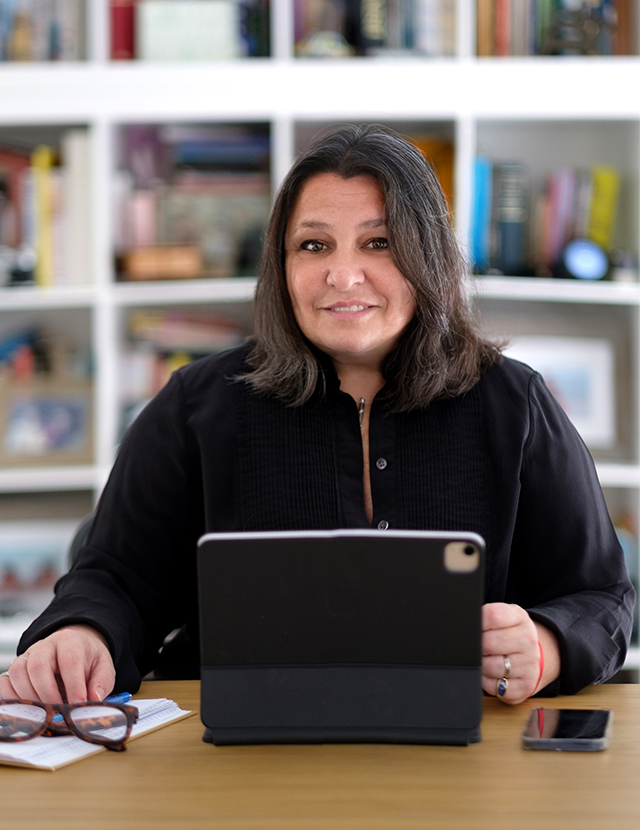|
Getting your Trinity Audio player ready...
|
Alejandra Flah has a few north stars in her back pocket. These have guided her since her family moved from Argentina to Canada when she was eighteen years old.
“I had traveled before, but when I moved to Toronto and I got on the subway, every single nationality seemed to be represented on the train,” Flah shares. “When I started going to class, everybody had an accent, not just me.”
She felt pulled by the expansiveness of an international perspective and environment, so much so that she has molded the trajectory of her career and life upon it, prioritizing understanding and diversity in the way she works. Flah is currently a managing director with Citi’s Latin America legal team in Miami and has lived in Argentina, Canada, and the United States. In Toronto, she worked for the Argentine Consulate, law firm McCarthy Tétrault, and Scotiabank. No matter her role, she’s led her teams with the same mission in mind: practicing and fostering empathy and valuing attention to detail.
“You have to know yourself, you have to understand your limitations, and you have to be aware of what you aspire to, but also what you don’t aspire to.”
Alejandra Flah
“In everything you do, you have the opportunity to get to know a large number of people, their objectives and their motivations,” Flah explains. “If you pay attention to detail, something that does not just apply to legal documents, you get to understand people and learn from them, which helps you to have a more meaningful interaction, even when you are in disagreement.”
She continues, “You are much better equipped to build a fruitful relationship, even with people across the table from you in a negotiation, if you’ve tried to understand, learn, and ask questions. At that point, you’re in a much better position to say, ‘Well, the reason I disagree with your point is x, I think there’s a better way to do it, or you are right.’”
Working at Citi
Flah’s attentive ear has also helped her hone her leadership style. She gathers cues from her team of six and those with whom she crossfunctionally works with to better appreciate when she should lead with compassion or when the right kind of challenge can be an added motivator.
“I really do try to get people interested in the work I’m asking of them or what I need them to help me with,” she explains. “As a team, we try to avoid an attitude that we’re asking people to do things for us; we let them know we are asking for their help because they have knowledge or expertise that is valuable, and we are also trying to help them so that it becomes a much more cooperative and collaborative relationship across the Latin America region.”

Flah enjoys the followthrough her role allows. Working in-house often involves kicking off a transaction and understanding the trickle-down effect of her and her team’s work.
“When I accepted to work for Citi, I was very interested in the fact that I was going to have the chance to work much more exclusively with Latin America . . . and this was also going to give me an opportunity to broaden my experience beyond just transactions and gain a better understanding of the day-to-day in the region, whether it’s transactional work, labor matters, litigation, or the impact of a political or economic crisis in a country,” she reflects.
Flah observes that within Latin America, there are many different cultures. She credits the diversity of approaches and experiences for making her team stronger.
“When you are in the middle of a transaction, you could do the transaction and get out. But to me, relationship building happens when you continue dealing with the issues that arise, [and] that is something that very much happens when you’re working in-house and when your work expands beyond going from one deal to the next,” she says.
The Power of Soft Skills
Whether she’s managing her team or clients’ expectations, Flah leads with the same truth in mind: relationships benefit from the face time invested in them. “People want to see your face, and it makes a difference in the dynamics of the work you are doing.,” she says. “Even for the smallest things, people establish different connections when you interact with them in person as well as when you truly engage with them.”
Flah has seen firsthand how attention to detail has helped her own team feel more seen and supported.
“When you become more senior, you need to guide, you need to encourage, you need to coach, and make sure that your team and the people you work with understand and are passionate about what they’re doing,” she says. “Building teams and relationships happens when team members understand the impact of their work [and] why it’s important. I try to do that with everybody who I’m working with. My first approach is to understand who they are and what motivates them by paying attention to what they say and how they act.”
“Building teams and relationships happens when team members understand the impact of their work [and] why it’s important.”
Alejandra Flah
Flah also acknowledges that she is far from flawless and admits she is trying just as much as the next person. But she also notes that perfection isn’t what has gotten her this far in her career. Instead, it’s been her appetite for understanding everyone’s perspectives and listening just as actively as she speaks.
“You have to know yourself, you have to understand your limitations, and you have to be aware of what you aspire to, but also what you don’t aspire to,” she advises. “If you want to excel in your career . . . you have to work hard. At least, that’s been my experience. Nothing has come easy for me, I’ve done well, but I’ve worked very, very, very hard.”

